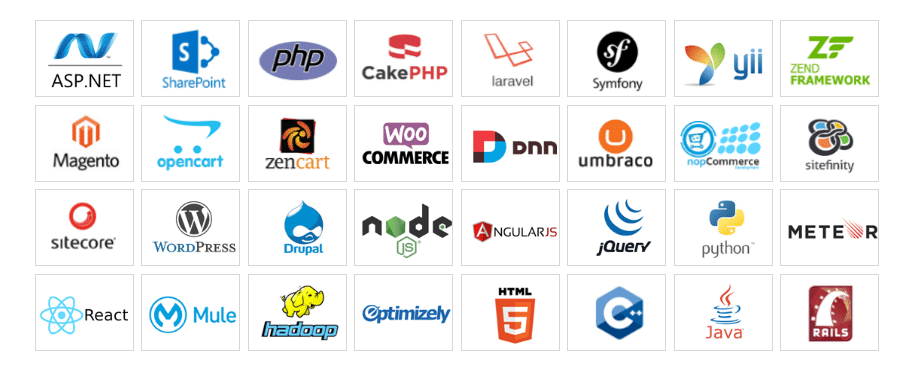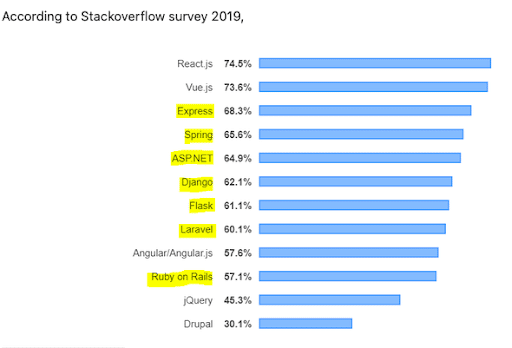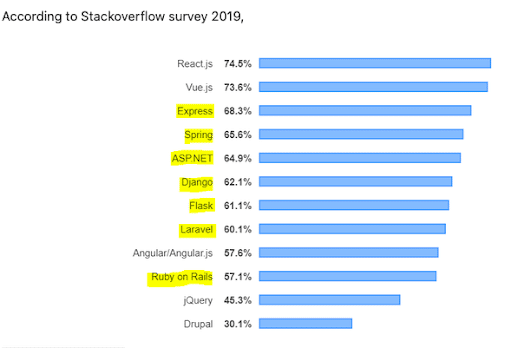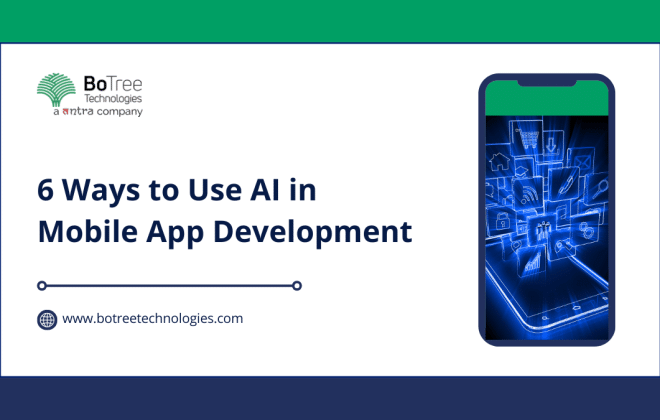
10 Best Web Development Frameworks
It is no surprise that web development has become essential for enterprises to build their online presence. Whether it is a website or a web application, enterprises today need to stay connected to their customers through the web.
But once you decide to get a web application, another question rises – which is the best framework for web development? In essence, there are separate frontend web development frameworks and backend frameworks.
The top web development frameworks for frontend enable developing world-class user interfaces and design the overall experience of the application.
The backend frameworks for custom web app development enable adding functionality to the website, which is mostly with the help of programming languages.
Choosing the best web application development framework is a challenge. There are so many options available. You need to consider a lot of factors before deciding which one is best for you. Some of these factors include:-
- Ease of installation
- Libraries
- License
- Learning curve
- Coding simplicity
- Testing
- Scalability
- Community
- Documentation
Most enterprises prefer a framework that enables rapid product development. In this growing competition, getting a product as early as possible is better for acquiring investments and reaching more people.

Top Frontend Web Development Frameworks

According to statistics, 59% of people will browse or read something through an elegantly designed application rather than a boring website. Listed below are the top web development frameworks for frontend development.
1. React
In 2019, React was the most popular web development framework for the frontend, with a staggering 21.5% market share. While React is not a framework but a library by Facebook, developers consider it in the context of a framework.
If you are looking for a high-performance web application with an unmatched UI, React should be your choice of web app development framework. React’s distinctive features enable enterprises to design UI, which are extremely elegant.
In 2015, Facebook launched React Native for building native UI for both Android and iOS. It allows enterprises to use the same codebase for developing native apps, reducing the development time by 25%.
2. Vue
Even though Vue is comparatively one of the youngest frontend web development frameworks, it is now the second-best framework for web development with a 16.1% market share in 2019.
Vue doesn’t require any additional extension for web development. It is a highly-preferred framework for single-page applications.
For bigger projects, the easy integration with libraries makes Vue one of the most popular web development frameworks for the frontend. Vue is a really small framework in size, increasing the speed of the application in general.
Vue has a component-oriented structure, giving preference to reusable code and increasing flexibility during development. It is an excellent choice for mobile UI development.
3. Angular
With a 12.2% share, Angular is the third-best web development frameworks for frontend development. Being a popular open-source web development frameworks, Angular is a part of the MEAN stack of the four major development frameworks – MongoDB, Express, Angular, and Node.js.
Angular is created in TypeScript, bringing high functionalities to the framework – class syntax, arrow functions etc.. It is an MVC frontend framework and uses two-way binding which encourages the view and model layer to always be in sync.
As a frontend framework for web development, it is great for handling webpages. It is also an excellent choice for building ecommerce applications.
The component-based architecture of Angular enables enterprises to reuse the single code and components for building multiple applications.
4. Ember
Some of the popular web applications like Netflix, LinkedIn, and Microsoft use Ember in their technology stack. Ember.js is an open-source web development framework created with JavaScript.
It is used for building scalable SPAs, desktop applications, and mobile applications. It is built on the MVVM pattern, enabling completely efficient development.
There are multiple beautiful templates for designing the UI for mobile and web applications. These templates are written with Handlebars – a popular templating language.
The complete repository of plugins makes Ember one of the most popular frameworks for web development. From authorization to administration management, plugins enable quick development and provide better access to design & templates.
5. Meteor
Created with JavaScript, Meteor is one of the top web development frameworks for frontend development.
Meteor enables rapid prototyping, making it a preferred choice for enterprises looking to quickly launch their products in the market.
The framework enables cross-platform application development. It simplifies the deployment and scaling process, allowing enterprises to select it for future expansion.
As one fo the best frameworks for web development, Meteor is a cloud deployment platform which allows enterprises to build real-time applications on the cloud.
Top Backend Web Development Frameworks
Approximately 47% of people expect a website to load within 2 seconds or less. To achieve this functionality, backend web development frameworks play a primary role. Listed below are the top web development frameworks for the backend.

1. Ruby on Rails
One of the oldest web app development frameworks, Ruby on Rails enables rapid development for web and mobile applications. It reduces the development time by 25% to 40%.
Ruby on Rails is preferred by enterprises because of its Convention Over Configuration and Don’t Repeat Yourself principles. In fact, frameworks like Django, Ember, etc., are inspired by these principles of Ruby on Rails.
Ruby on Rails is a developer-friendly framework for web development. It has a simple learning curve with countless possibilities of growth.
It is one of the top web development frameworks in 2020 as it is extremely affordable. On top of that, RubyGems allows developers to add rich-functionalities and reduce the hassle of writing code for every feature.
2. Django
With a 7.8% market share, Django is another of the popular web development frameworks. Django is highly popular for building fast-moving applications with deadlines.
Django is the most popular Python frameworks for web development. It allows building complex, data-driven websites, following the simple principles of PHP.
The backend web development framework provides flexibility to enterprises during development with its integration with feature-rich libraries. It enables fast API development and web applications.
Django is also the top web development frameworks for machine learning and artificial intelligence app deployment. It offers computational libraries and statistical capabilities for data science applications.
From social networks to content management systems, Django is a good fit for building large scale applications.
3. Laravel
Laravel is quickly becoming the choice of web app development framework for backend development. It is engineered on PHP for building robust web applications.
It offers a clean and simple syntax, allowing developers to write code without any complexity. The database migration system of Laravel will enable developers to rapidly share the database schema for building applications.
Packages like Horizon, Lumen, Nova, Spark, and other packages provide a robust ecosystem for building high-performing web applications.
Being third on the web development frameworks list for backend, Laravel is a modern toolkit with a powerful queue library, routing, simple authentication, and amazing ORM for delivering applications.
Laravel’s learning curve makes it easier for developers to understand the language and build applications without any difficulty.
4. Spring Boot
A popular web development framework for backend, Spring Boot is created with javascript. Developers can write production-grade backend web applications.
Spring Boot has the microservices feature, which allows handling a large load of requests from multiple platforms and devices. It is a robust web app development framework with a highly functional ecosystem.
It is a popular framework for building standalone web applications which are ready-to-run and provides rapid development. It allows for adding dependencies with ease.
Spring Boot allows creating portable, flexible, JVM based systems and applications. It is a popular application development framework for enterprise Java.
For particular projects, Spring Boot has a simpler learning curve, and several tutorials are available for helping developers with dependencies.
5. CakePHP
Another top web development frameworks for backend, CakePHP enables developers to build rapid applications with less coding. It is a popular framework for both small and large scale enterprise application development.
Integrated with PHP 7, CakePHP offers improved error handling and a flexible database layer, allowing developers to swiftly utilize database layers.
By generating the code quickly, enterprises can rapidly build web applications. Licensed under MIT, CakePHP enables building commercial applications. It comes with in-built tools for powerful and functional web applications.
CakePHP works on the Model-Control-View model. One of the interesting things about CakePHP as a web app development framework for backend is that it allows developers to reuse the code of older projects. It saves enterprises a lot of time and money in building applications.
Conclusion: Which Framework Should You Choose?
Choosing the best web app development framework depends on your requirements. Considering the recent trends, Ruby on Rails is an extremely valuable framework for small applications.
On the other hand, Django is preferred for building high-end and large scale web applications. Its computation capabilities make it the best framework for machine learning model deployment.
Similarly, React Native is now the top web development framework for frontend development because of its cross-platform capabilities and code reusability.
BoTree Technologies is a leading web application development company, building highly-powerful and functional apps for small enterprises, startups, and MNCs.
Click here for more details…
At BoTree Technologies, we build enterprise applications with our team of 70+ engineers.
We also specialize in RPA, AI, Django, JavaScript and ReactJS.




